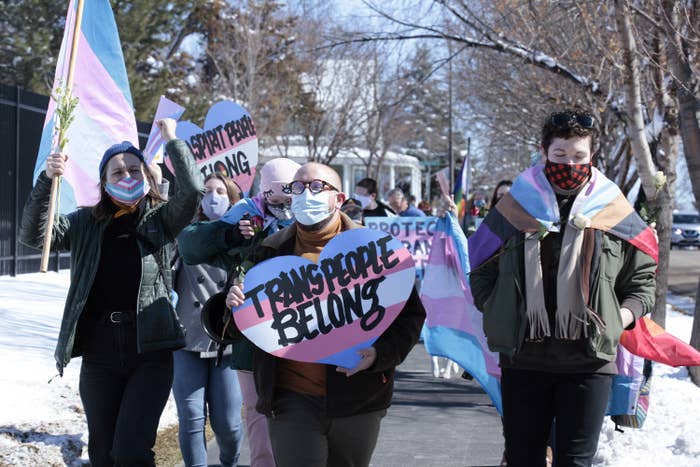
Mississippi Gov. Tate Reeves signed into law Thursday a ban on transgender student-athletes playing girls' and women's sports, part of a wave of Republican-led efforts to exclude trans people from athletics.
Similar bills have been introduced in more than 20 states since last year, according to the American Civil Liberties Union, with a purported goal of "saving women's sports." But the NCAA has had policies to allow trans athletes to participate in sports for years, and opponents of the legislation say it's simply about discrimination.
Mississippi's law comes after President Joe Biden signed an executive order Jan. 20 underlining protections for LGBTQ people. It explicitly referenced school sports as an area where discrimination should not be tolerated as it directed federal agencies to enforce the US Supreme Court's 2020 ruling that the federal ban on sex discrimination in workplaces also protects employees on the basis of sexual orientation and gender identity.
After signing the bill on Thursday, Reeves, a Republican, specifically mentioned Biden's order in a statement on Twitter, saying, "POTUS left us no choice."
"One of his first acts was to sign an EO encouraging transgenderism in children. So today, I proudly signed the Mississippi Fairness Act to ensure young girls are not forced to compete against biological males," the governor tweeted.
Barring any legal challenges, the law is set to take effect July 1 and will apply to interscholastic teams from elementary school all the way up to the collegiate level.
Other states could follow within the coming days. On Monday, after South Dakota's legislature passed their version of the bill, Gov. Kristi Noem tweeted that she was "excited" to sign it into law, describing its passage as a celebration of International Women's Day "by defending women's sports."
Proponents of the measures have argued that trans athletes have unfair physical advantages over their cis counterparts but have offered little evidence to back that up. (A 2016 review of literature about transgender sports participation found "no direct or consistent research" to suggest that's the case.)
"There's really no evidence that there is this categorical advantage that trans athletes have some specific type of advantage by virtue of being trans," Jett Jonelis, advocacy manager for the ACLU of South Dakota, told BuzzFeed News, saying that those arguments are based on inaccurate stereotypes about biology, athleticism, and gender.
Jonelis argued legislation that prevents trans girls and women from participating in sports consistent with their gender identity actually hurts all women, "particularly girls of color whose bodies are so often subject to heavier scrutiny."
"There's nothing about this bill that is a celebration," they said.
Sasha Buchert, senior attorney and codirector of Lambda Legal’s Transgender Rights Project, said in a statement that the Mississippi law and the bill on the governor's desk in South Dakota will only "exacerbate the bullying and discrimination" that trans young people already face "simply because of who they are."
“Supporters of this legislation cannot point to a single case in their states to justify the rank discrimination they seek to enshrine," Buchert said. The Associated Press last week asked two dozen lawmakers if there had been problems with trans girls competing in high school sports in their states; almost none could provide an example.
In August, a federal judge blocked a similar ban in Idaho after determining that the state failed to provide proof that allowing trans athletes to compete in sports that align with their gender identity would "hinder sex equality" in sports.

"The State has not identified a legitimate interest served by the Act that the preexisting rules in Idaho did not already address, other than an invalid interest of excluding transgender women and girls from women's sports entirely, regardless of their physiological characteristics," Judge David Nye wrote in an order granting the ACLU's motion for a preliminary injunction.
In a statement Thursday, the ACLU of Mississippi accused state lawmakers of using students and children as "political pawns" to discriminate against trans people, saying the bill was not really about protecting fairness in women's sports.
"It’s about erasing and excluding trans people from participation in all aspects of public life," the ACLU affiliate said. "Not once have the supporters of this bill cited an actual dispute over this issue in Mississippi."
On Wednesday, a group of more than 500 collegiate athletes sent a letter to the NCAA, demanding the association stop holding championships and events in states that have adopted or are considering bills that would prohibit trans athletes from participating on sports teams that align with their gender identity.
The athletes said even with the court's injunction, the Idaho law "sets a dangerous precedent of subjecting all women athletes to potential invasive gender verification tests while also effectively banning transgender women athletes from competition." Mississippi's law states that if a student's gender is disputed, they could provide a physician's statement to prove their sex, which must only be based on their reproductive anatomy, "normal endogenously produced" testosterone levels, and an analysis of their genetic makeup.
"It is imperative that we know we are safe and supported in the NCAA no matter where we travel to compete," the letter reads. "The NCAA claims to prioritize the safety, excellence, and physical and emotional well being of its student athletes and asserts that all athletes deserve a fair shot. However, it is impossible for women athletes to feel safe and supported in environments where their personal identity and integrity is questioned."
In a statement provided to the Associated Press, the NCAA, which has had policies in place that allow trans athletes to participate in sports since 2011, said it was monitoring the legislation.
“The NCAA believes in fair and respectful student-athlete participation at all levels of sport,” the statement says. “The NCAA believes diversity and inclusion improve the learning environment and it encourages its member colleges and universities to support the well-being of all student-athletes.”
